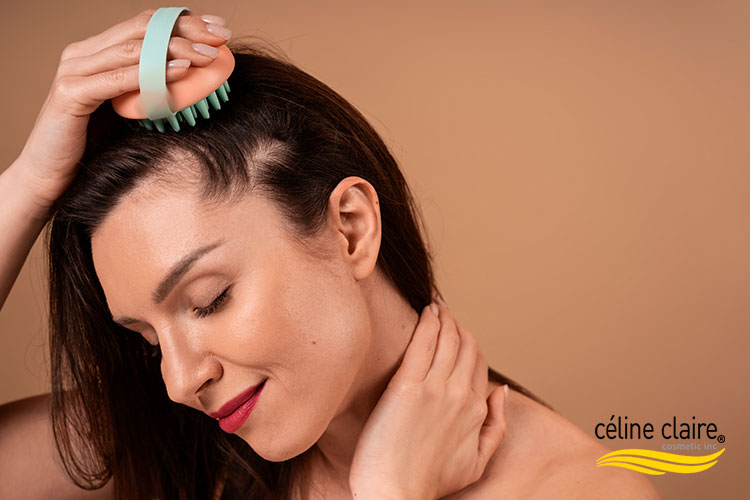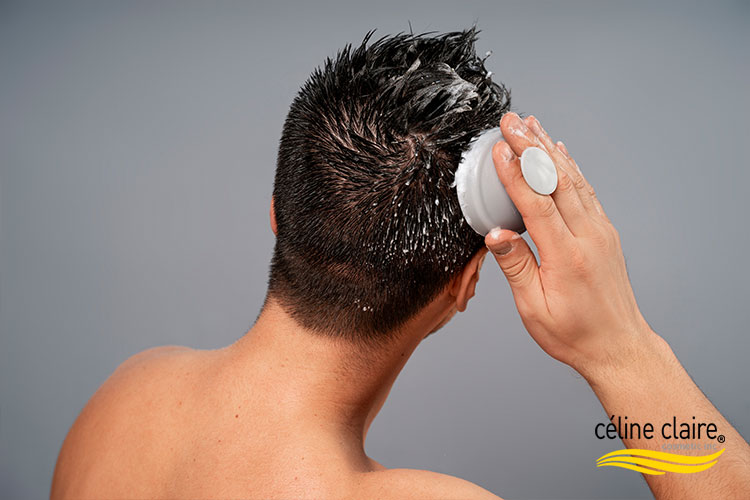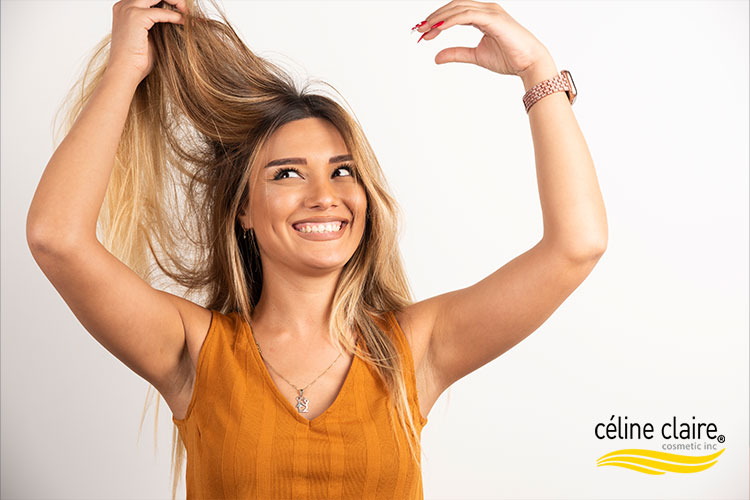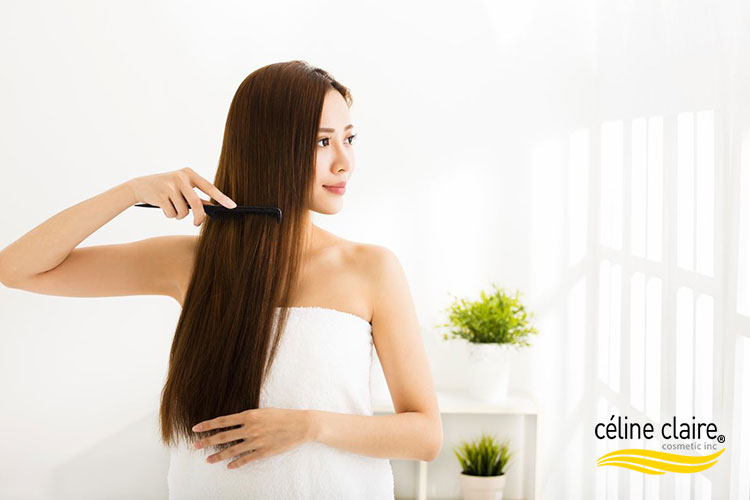
Scalp Exfoliation: Benefits, Products
Imagine standing in front of a mirror, running your fingers over your hair. You have your favorite shampoo, conditioner, and perhaps a few serums or oils on your bathroom shelf, all of which promise to give you the lush life and healthy hair you’ve always desired.
But something still seems off your hair does not appear to be behaving in the manner you want it to. It’s as if there’s an invisible barrier between those high-end hair care products and the brilliant, shiny locks they promise.
This is when scalp exfoliation enters the scene. While we’ve been taught to pamper our hair using multiple treatments, we sometimes ignore the necessity of caring for the basic base of our hair the scalp.
Just as exfoliating your face may reveal a new, glowing complexion, exfoliating your scalp can revive the skin underlying your hair by removing dead skin cells, oils, and product leftovers that may be limiting your hair’s full potential.
Self-care practices can feel like both a luxury and a need for people who often manage busy lives. Whether you’re juggling busy work, facing the challenges of parenting, or simply trying to find time for yourself among your regular tasks, it’s tempting to stick to the essentials in your hair treatment routine and overlook game-changing methods like scalp exfoliation.
However, investing a few extra minutes to focus on your scalp may make a huge impact, especially when it comes to increasing the efficiency of your favorite hair care products.
What is Scalp Exfoliation?
Scalp exfoliation may sound like another beauty slang, but it is a treatment based on fundamental skincare principles. To put it simply, scalp exfoliation is the gentle removal of dead skin cells, excess oil, and leftover products from the scalp. Scalp exfoliation is similar to exfoliating your face, except instead of showing beautiful skin, it may support healthier, thicker hair growth.
Scalp exfoliation can be performed in a variety of methods, each with its benefits:
Physical Exfoliation
This involves using scrubs, brushes, or exfoliating shampoos with small particles to physically remove dead skin cells. It’s similar to using a face scrub, in which the aim is to remove the top layer of dead skin. Physical exfoliants are especially beneficial for people who prefer the instant feeling of having their scalp cleansed.
Chemical Exfoliation
Chemical exfoliants use chemicals such as salicylic acid or alpha-hydroxy acids (AHAs) to break down the bonds that keep dead skin cells together, causing them to be washed away without the need for physical scrubbing.
These are similar to the chemical peels you may use on your face for deeper exfoliation. Chemical exfoliants are especially useful for people who have sensitive scalps and find physical exfoliation too harsh.
Why Scalp Exfoliation Matters
Scalp exfoliation has more advantages than just making your scalp clean. When you exfoliate on a regular basis, you not only remove the buildup that might weigh down your hair, but you also create an environment suitable for healthy hair growth.
By removing dead skin cells and extra oils that can clog hair follicles, you let your scalp breathe and your hair will grow stronger and healthier.
Moreover, scalp exfoliation can help regulate oil production. If you’ve ever had an oily scalp, you’ll understand how bothersome it can be to wash your hair in the morning only to have it greasy by the end of the day. Exfoliating your scalp can help control oil production, minimizing greasy buildup and allowing your hair to seem fresher for longer.
On the other hand, if you have a dry scalp, exfoliating can help remove flaky skin, allowing hydrating treatments to work effectively.
What Are the Benefits of Scalp Exfoliation?
Now that we’ve addressed the basics of scalp exfoliation, let’s discuss why it’s such a major changer in your hair care routine. You may be thinking, “Is it worth adding another step to my treatment?” The answer is definitely yes, especially if you want to maximize the effectiveness of your hair treatment products to get the healthy, beautiful hair you’ve always wanted.
Promotes Healthy Hair Growth
One of the major benefits of scalp exfoliation is its ability to support healthy hair growth. When dead skin cells, excess oils, and product leftovers remain on your scalp, they can block hair follicles, preventing hair growth. Regular exfoliation of your scalp removes this buildup, enabling your hair follicles to breathe and operate correctly. This provides an ideal environment for hair growth, allowing you to maintain thick, gorgeous locks.
Balances Oil Production
Whether you have an oily scalp or suffer from dryness, scalp exfoliation can help regulate your scalp’s natural oil production. Regular exfoliation helps remove extra oil from the scalp, reducing the greasy buildup that may cause hair to seem thin and lifeless. If your scalp is dry, exfoliating can help eliminate flaky skin, allowing your moisturizers to enter deeper and work more efficiently.
Enhances the Effectiveness of Hair Products
We said this before, but it’s worth repeating: scalp exfoliation may greatly improve the effectiveness of your hair care products. When your scalp is clear of buildup, serums, oils, and treatments may penetrate deeper to deliver nutrients straight to your hair follicles, where they are most needed. This means your hair repair treatments will work better, and you may even need to use less product overall.
Prevents and Treats Dandruff
Dandruff is commonly caused by an overgrowth of yeast on the scalp, which feeds on the excess oils and dead skin cells that build up over time. Exfoliating your scalp regularly can help remove the dirt that yeast grows on, preventing dandruff from forming. If you already have dandruff, exfoliation can help minimize flakes and soothe your scalp, especially when used with an anti-dandruff product.
Improves Scalp Circulation
Exfoliating your scalp has the added advantage of improving blood circulation. When you massage your scalp during exfoliation, you stimulate blood flow to the hair follicles, which can lead to healthier hair development. Improved circulation means more oxygen and nutrients are given to the scalp, which helps nourish your hair from the roots.
What is the Scalp Exfoliation Method?
Now that you’re aware of the benefits of scalp exfoliation, let’s talk about how to perform it. The method is simple, but there are a few things to consider to ensure that you are exfoliating effectively and safely.
Choose the Right Exfoliant
The first step is choosing the right exfoliant for your scalp. As already mentioned, there are two types of exfoliants: physical (scrubs and brushes) and chemical (salicylic acid or AHAs). The best option depends on your scalp type and personal preferences. If you have sensitive skin, you could choose a light chemical exfoliator, while others with a rougher scalp may prefer the sensation of a physical scrub.
How to Apply
After you’ve chosen an exfoliator, apply it to your scalp in sections. Begin by separating your hair to reveal your scalp, then apply the product straight to your skin. Use your fingertips to gently massage the exfoliant into your scalp in circular strokes. Take your time with this step; scalp exfoliation is as much about the process as the result.
Tip: Use this time to relax and practice mindfulness. Consider scalp exfoliation a small spa treatment, a moment of self-care that not only improves your hair but also helps you relax.
Rinse Thoroughly
After massaging the exfoliant into your scalp, make sure to properly rinse. Any remaining substance might lead to buildup, defeating the purpose of exfoliation. Use moderately warm water and take your time to make sure that the substance is completely washed away.
How Often Should You Exfoliate Your Scalp?
The frequency of scalp exfoliation differs according to your scalp type and the product you’re using. Exfoliation is generally suggested once a week, however this might vary. If you have an oily scalp or use a lot of heavy-style products, exfoliating twice a week may help. However, if your scalp is sensitive or dry, once every two weeks may be enough.
Question to Consider: How does your scalp feel in between washes? If you find your scalp becoming greasy, itchy, or flaky a few days after washing, you may need to exfoliate more regularly.
Introducing Products That Prevent Dandruff
If you have dandruff, there are solutions that can help while also offering the advantages of exfoliation. Look for products with anti-dandruff chemicals such as zinc pyrithione, salicylic acid, or ketoconazole. These substances assist to prevent yeast development on the scalp while also reducing flaking.
Consider including a scalp scrub or shampoo with salicylic acid into your hair care routine. This substance not only exfoliates, but also removes flakes and reduces dandruff. Combining it with a gentle conditioner will keep your scalp hydrated and balanced.
Possible Dangers of Peeling the Scalp
While scalp exfoliation offers many advantages, it’s essential to be aware of the dangers particularly if done ineffectively.
Over-Exfoliation
One of the most common risks is excessive exfoliation. If you exfoliate too frequently or use a harsh product, you might remove the natural oils that protect your scalp, causing dryness, irritation, and even more dandruff. It’s critical to listen to your scalp and adjust your routine accordingly.
Chemical Burns
If you’re using a chemical exfoliant, make sure to follow its instructions properly. Leaving the product on for too long or applying it too frequently could cause chemical burns, resulting in redness, peeling, and sensitivity.
Infection Risk
Excessive exfoliation can cause small abrasions on the scalp, increasing the risk of infection. This is especially important if you use shared styling tools or have any open cuts or wounds on your scalp.
Conclusion
Scalp exfoliation is more than just a trendy addition to your hair care routine; it’s an essential step in having the healthy, attractive hair you deserve. Exfoliating your scalp regularly not only improves the effectiveness of your hair care products but also promotes scalp health and hair development.
So, the next time you engage in some self-care, remember to treat your scalp well. After all, a healthy scalp is the foundation for beautiful hair, and with proper care, you can ensure that each strand shines beautifully.
FAQ
Can scalp exfoliation help with hair growth?
Yes, by removing buildup and unclogging hair follicles, scalp exfoliation can promote healthier hair growth.
How often should I exfoliate my scalp?
It depends on your scalp type, but generally, once a week is a good starting point.
What’s the difference between physical and chemical exfoliation?
Physical exfoliation uses scrubs or brushes to remove dead skin cells, while chemical exfoliation uses acids to dissolve them.
Can scalp exfoliation prevent dandruff?
Yes, regular exfoliation can help prevent and reduce dandruff by removing excess oil and dead skin cells.
Is it safe to use chemical exfoliants on the scalp?
Yes, but follow the product instructions carefully to avoid irritation or chemical burns.
What are some signs that I’m over-exfoliating my scalp?
Signs include dryness, redness, irritation, or an increase in flakiness.
Can I exfoliate my scalp if I have a sensitive scalp?
Yes, but opt for gentle, non-abrasive products and exfoliate less frequently.
Will scalp exfoliation make my hair look greasy?
No, in fact, it can help balance oil production and keep your hair looking fresh.
Can I use regular exfoliating scrubs on my scalp?
It’s best to use products specifically formulated for the scalp to avoid irritation.
Should I exfoliate my scalp before or after washing my hair?
Exfoliate before washing to remove buildup and allow your shampoo to clean more effectively.





